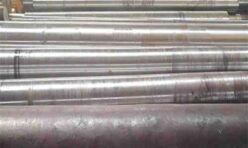Scopes
Corrosion-resistant tool steel with sulphur for plastic molds as well as aggressive plastics and for application fields, where a corrosion resistance, good machinability and good mechanical properties are important. The same properties like 1.2316 with the addition of sulphur.
This steel is mainly used in processes with chemically aggressive and acidic thermoplastics, PVC-aminoplastics, plastics for injection mold inserts or for special machine parts in the food industry.
Used also in the application field of the automobile industry and machine construction.
International identifiers
420FM, 1.2099, 4H13+S
CHEMICAL COMPOSITION:
C 0.33
Si 0.30
Mn 0.80
Cr 16.00
S 0.06
Ni 0.30

STRENGTH:
280 – 325 HB
(≈ 950 – 1100 N/mm²)
THERMAL CONDUCTIVITY AT 100 °C:
18 W/m K
Characteristics
Corrosion-resistant, pre-hardened mould steel with high strength.
Good machinability and high strength without subsequent heat
treatment.
Uses:
Cavity and frame plates in injection moulding and die-casting tools. Further applications in mould design for metal and plastics processing, where corrosion resistance is required due to aggressive plastics or damp climatic conditions.
Advantages of saw cut
The processing with the saw is a mechanical processing of the material, which results in a significantly lower unintended deformation and increased hardness for the existing structure, such as the thermal cutting.
Thus, the machined workpiece has a homogeneous structure even at the edge, which does not change in the continuation of the material.
This circumstance allows immediate finishing of the workpiece with milling or drilling . So it is not necessary to anneal the material or make a similar operation beforehand.
CHARACTER:
corrosion resistant, pre-toughened tool steel with good machinability due to Sulphur additive
APPLICATION:
plates for corrosion resistant mould bases and die sets;
moulds for corrosive plastics; the expense for protection and care of mould tools is reduced thanks to increased corrosion resistance; not suitable for mould inserts
TREATMENT BY
unusual:
Polishing, etching, EDM, nitriding, hard chroming
HEAT TREATMENT:
Usually no heat treatment is required
Soft annealing:
850 to 880 °C for about 2 to 5 hours
slow controlled cooling, further cooling in air, annealing hardness max. 240 HB
Hardening:
1000 to 1030 °C
keeping curing temperature for 30 minutes
quenching in oil is preferable
obtainable hardness: 48 HRC
Tempering:
slow heating to tempering temperature immediately after hardening;
minimum time in furnace: 2 hour per 20 mm part thickness;
tempering twice is recommended
